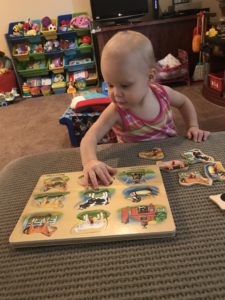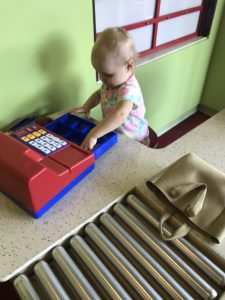by Beverly Smith, Kindermusik mom
When you think of teaching math to your child, you likely think of numbers, addition/subtraction and memorizing facts. As a mother and former elementary teacher with a math endorsement, I’m here to say math is so much more than numbers and memorization. 
Before technology took over our homes, we played to learn. We played board games, explored outside, turned our living room into a fort, baked cookies, sang songs, read books, played cards, and so much more. When you step back and think about it, we basically spent all day problem solving. We learned by playing and it prepared us for math in ways many of today’s kids are missing.
Learning math with board games
Though you likely didn’t realize it at the time, board games can be a great way to start or reinforce math skills. Think about playing Monopoly.
| Action | Math or critical thinking skills |
| Rolling dice | Counting dots (one to one correspondence) Simple addition (counting on) |
| Purchasing properties | How and when to spend money |
| Using money | Counting, spending and saving money |
| Moving Monopoly pieces | Spatial awareness and one to one correspondence |
Even while playing, kids are constantly doing math, regardless of whether they actually finish a game of Monopoly. 
Keep kids learning throughout the day
- I was an avid rock collector, lightning bug catcher and hopscotch master. Those common outdoor activities helped me to learn counting, sorting and comparing more and less. My sister and I would always compare who could catch the most bugs or who could fill a bucket with the most wild blackberries.
- Inside at the dining room table, we’d play cards for hours on end. Three-year-old me had a few favorites ... War, Go Fish, and Rummy. We learned to recognize and compare numbers, count objects on the cards, and solve problems.
- In the living room, our couch cushion forts, tents and imaginary tree houses taught spatial awareness.
- In the kitchen, we learned how to follow directions, measure quantities and count cookies while helping our mom bake.
- At night, we’d read books for hours — by ourselves, or with sibling and parents. As we turned the pages we’d learn about time, measurement, problem solving, and the value of an adventure.
- Even riding in the car, we’d spend our days singing along to nursery rhymes and songs that taught counting, timing, and history.
Many kids learn best when they’re engaged in play. Technology is great at supplementing all you do, but most kids learn from experiences. The more senses they use, the more engaged their mind becomes and the more they learn.
Make a commitment
I get it. We’re all super busy. In my household we have a rule of no TV while our daughter is awake. Believe me, it can be hard, but I’ve learned to cherish our time together. So how can you fit in play with the busy lives we lead?
- Plan a weekly game night
- Make a rule of no electronics for certain hours in the day
- Incorporate reading or songs into your bedtime routine
- Turn off the TV and play
Kids are only little once, so make a commitment to teach new skills and create new memories through play. You won’t regret it.
